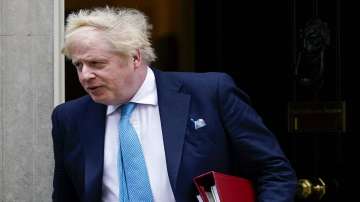Anyone testing positive for COVID-19 will no longer be legally bound to self-isolate, as all remaining coronavirus restrictions come to an end for England on Thursday. Under British Prime Minister Boris Johnson’s “living with COVID plan” laid out earlier this week, the requirement to quarantine for at least five days is now advice rather than law. It comes as guidance for staff and students in most education and childcare settings to undertake precautionary twice-weekly asymptomatic lateral flow testing was also scrapped.
"Because of the efforts we have made as a country over the past two years, we can now deal with it in a very different way, moving from government restrictions to personal responsibility, so we protect ourselves without losing our abilities and maintaining our contingent capabilities so we can respond rapidly to any new variant," Johnson said.
From Thursday, adults and children who have the virus will be advised to self-isolate – but this won't be a legal requirement. Vaccinated contacts of people who have tested positive will no longer be asked to do daily lateral flow tests for seven days and contact tracing of COVID positive individuals will also come to an end.
Taxpayer-backed support payments for people who would have previously self-isolated with COVID will end and businesses will no longer be legally required to tell staff to self-isolate if they have COVID. These rules have been in place since March 2020 when the UK imposed its first complete, stay at home lockdown to control the spread of coronavirus.
Meanwhile, in London, Transport for London (TfL) has announced that passengers will no longer be legally required to wear face coverings on tubes and buses. TfL had continued with the rule even after the government scrapped the requirement to wear face coverings on public transport on January 27. For the devolved regions of the UK, Scotland's legal COVID-19 restrictions, including the wearing of face coverings, will end on March 21. In Wales, people will no longer need to wear face coverings in all indoor places including schools from February 28.
However, masks will still be required in shops, health and care facilities and public transport. If cases continue to fall, it is hoped all mask rules will be lifted by the end of March. In Northern Ireland, all COVID restrictions were revoked on February 15. This means that people will not be punished for not following restrictions, though they are still encouraged to do so.
England and Northern Ireland have joined Denmark, Norway and Sweden on the list of European countries to have lifted all COVID restrictions. The British Medical Association (BMA) said the government's plan would likely cause "more uncertainty and anxiety" for the most vulnerable and called for more provisions to protect them. The Opposition Labour Party is unhappy over the withdrawal of support payments, with leader Keir Starmer warning that the decision “will hit the lowest paid and the most insecure workers the hardest”.
The UK recorded 39,656 cases and 164 COVID deaths on Wednesday, with hospitalisation of severe cases on the decline consistently. It is expected that the daily government “dashboard” related to such COVID-19 data is also on its way out following a decision not to publish weekend figures going forward. The UK Health Security Agency (UKHSA) said on Tuesday that all Saturday and Sunday cases and deaths will be rolled into Monday’s data without being separated retrospectively.
Also Read | COVID: Britain lifts restrictions, says omicron wave ‘has peaked’
Also Read | COVID shots unlikely to prompt rare inflammation in kids
Latest World News
